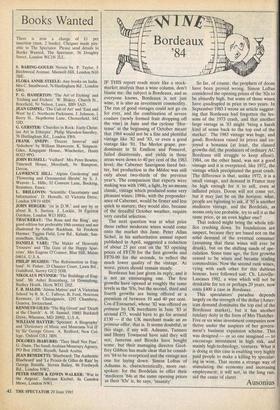L
Bordeaux '84
IF THIS report reads more like a stock- market analysis than a wine column, don't blame me: the subject is Bordeaux, and as everyone knows, Bordeaux is not just wine, it is also an investment commodity. The run of good vintages could not go on for ever, and the combination of severe coulure (newly formed fruit dropping off the vine) in June and the' cyclone 'Hor- tense' at the beginning of October meant that 1984 would not be a fine and plentiful vintage like '82 and '83, or even a good vintage like '81. The Merlot grape, pre- dominant in St Emilion and Pomerol, failed disastrously, and yields in those areas were down to 40 per cent of the 1983 level; the Cabernet Sauvignon fared bet- ter, but production in the Medoc was still only about two-thirds of the previous year's. The comparison that experts were making was with 1980, a light, by no means classic, vintage which produced some very pleasant wines: 1984s, with the preponder- ance of Cabernet, would be firmer and less quick to mature; they would also, because of the dreadful October weather, require very careful selection.
The next question was at what price these rather moderate wines would come onto the market this June. Peter Allan Sichel, in his authoritative annual report published in April, suggested a reduction of about 25 per cent on the '83 opening prices of FF170 for the first growths and FF70-90 for the seconds, to reflect the much lower quality of the vintage. At worst, prices should remain steady.
Bordeaux has just given its reply, and it is not an encouraging one. The first growths have opened at roughly the same levels as the '83s, but the second, third and fourth growths are being offered at a premium of between 10 and 40 per cent. Cos d'Estournel, whose '82 was offered en primeur by UK merchants in June '83 at around £75, would have to go for around £130 — if the UK merchant made an en primeur offer, that is. It seems doubtful, at this stage, if any will. Adnams, Tanners and Henry Townsend have said they will not; Justerini and Brooks have bought some, but their managing director Geof- frey Gibbon has made clear that he consid- ers '84 to be overpriced and the vintage not one for laying down. Simon Loftus of Adnams is, characteristically, more out- spoken: for the Bordelais to offer their 'mediocre '84s at the same opening prices as their '83s' is, he says, Insanity'. So far, of course, the prophets of doom have been proved wrong. Simon Loftus considered the opening prices of the '82s to be absurdly high, but some of those wines have quadrupled in price in two years. In September 1983 I wrote an article suggest- ing that Bordeaux had forgotten the les- sons of the 1973 crash, and that another large vintage in '83 might 'bring a harsh kind of sense back to the top end of the market'. The 1983 vintage was huge, and , good; Bordeaux raised its prices and en- joyed a bonanza (at least, the classed growths did; the producers of ordinary AC Bordeaux still struggle to keep afloat). 1984, on the other hand, was not a good vintage and it is overpriced, like 1972, the vintage which precipitated the great crash. The difference is that, unlike 1972, it is a !small vintage, and demand in France may be high enough for it to sell, even at inflated prices. Doom will not come yet, but it may just be on the horizon: what, people are bginning to ask, if '85 is another mediocre vintage, and the Bordelais, as seems only too probable, try to sell it at the same price, 9r an even higher one?
That indeed might bring the whole edi- fice crashing down. Its foundations are suspect, because they are based not on the solid demand of the eventual consumer (assuming that these wines will ever be drunk), but on the shifting sands of spe- culation. Sbme time ago, the first growths ceased to be wines and became trading commodities. Now the second rank wines, vying with each other for this dubious honour, have followed suit. Ch. Leoville- Lascases 1982, a wine which will not be drinkable for ten or perhaps 20 years, now costs £400 a case in Bordeaux.
This speculators' paradise depends largely on the strength of the dollar (Amer- ican demand dominates the top end of the Bordeaux market), but it has another tutelary deity in the form of Mrs Thatcher.
Five or six wine investment companies now thrive under the auspices of her govern- ment's business expansion scheme. This was designed — or so one imagined — to encourage investment in high risk, and mainly high-technology, ventures. What it is doing in this case is enabling very highly paid people to make a killing by speculat- ing in wine. That seems a strange way of stimulating the economy and increasing employment; it will not, in the long run, aid the cause of claret.
Ausonius


























































 Previous page
Previous page